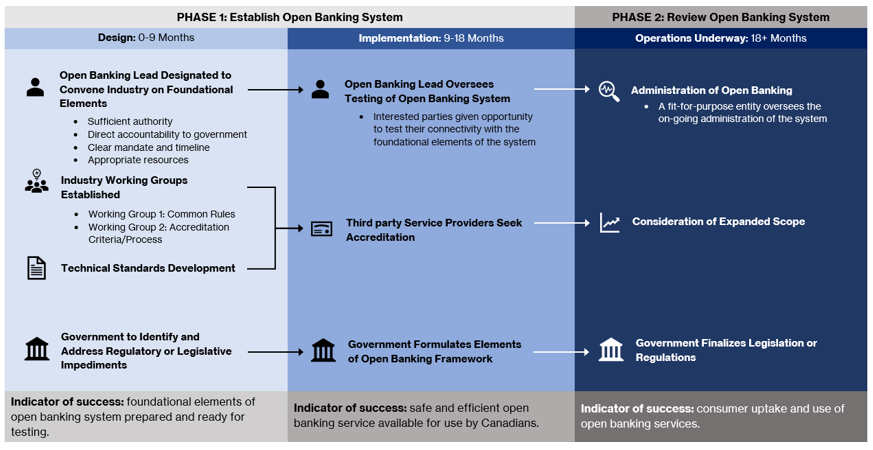After months of delays and anticipation, the Advisory Committee on Open Banking has dropped its final report on open banking, providing recommendations on how to modernize Canada’s financial services sector.
The Advisory Committees’ main concern appears to be eliminating the prevalence of financial data screen scrapping. The report recommends that the initial scope of Canada’s open banking system should be limited to data currently available to consumers and small businesses via online banking, and comprise read-only activities. Derived data would also be excluded.
The Advisory Committee recommends that this limited initial phase of open banking would become operational by January 2023.
Open banking, or consumer-directed finance (CDF), refers to a framework where consumers and businesses have the right to their financial data and can authorize third-party financial service providers to access their financial transaction data securely, as well as give authorized third-party financial service providers the ability to initiate payments on their behalf, all through APIs.
An approximation of open banking is already well underway in Canada, with the Advisory Committee on Open Banking’s report on phase-one consultations noting that as many as 4 million consumers are sharing their financial data with third-party financial service providers, albeit insecurely, through screen-scraping. But Canada is lagging behind others, such as the United Kingdom, Australia and the European Union, in developing a formal open banking system.
The report comes more than two years after the federal Ministry of Finance announced it would launch consultations on open banking. The report has long been anticipated by members of the Canadian financial innovation community, who are looking for regulations that support innovation and competition in the landscape.
RELATED: FinTech startups frustrated with glacial pace of Canada’s open banking consultations
In its absence, open banking services have commonly been taking place through screen-scraping, which requires consumers to provide their online banking username and password to access financial data. That method can pose security risks as the data is then transferred to a company’s external database.
The final report calls for the federal government to address screen scraping and replace it with an open banking system that is “safe, regulated, efficient, and protects [consumers’] interests.”
“Open banking will be successful in Canada if consumers and small businesses can intentionally share their data in a safe and efficient manner to access useful products and services without the use of screen scraping,” the report reads. “The availability of these new services will enhance the welfare of Canadian consumers and businesses and support innovation and economic growth in Canada without compromising the safety and stability of Canada’s strong financial system.”
“Consumer-driven finance, or open banking, is already part of Canadians’ lives,” said Chrystia Freeland, the deputy prime minister and minister of finance. “Many use digital services every day to manage their money, to budget for expenses, and to make investments. Working towards a regulated, made-in-Canada system will make sure that we continue to enjoy a strong, stable, and innovative financial sector that is globally competitive, promotes consumer choice, prioritizes data privacy, and contributes to economic growth.”
Freeland is now set to review the committee’s recommendations as the government builds out the next steps for its open banking strategy.

The Canadian FinTech ecosystem has called for a clear process for open banking, controlled by a government agency or neutral third party. The committee’s report suggests the creation of a “purpose-built governance entity” that would manage the ongoing administration of open banking. The report calls for the implementation to be a hybrid government and industry-led approach, with the government setting mandates and the entity making decisions. The committee’s report is noticeably vague on which “banking industry participants” would participate in the entity.
The report notes three “foundational elements” for the approach:
- Common rules for open banking industry participants to ensure consumers are protected and liability rests with the party at fault;
- An accreditation framework and process to allow third-party service providers to enter an open banking system; and
- Technical specifications that allow for safe and efficient data transfer and serve the established policy objectives.
While the committee suggests the creation of the governance entity, it also noted in the report that, in consultation with stakeholders, it became clear that “establishing and implementing a formal governance entity and legislative framework could take multiple years.” To that end, the committee recommends taking a “phased approach to open banking governance” that would see the appointment of a “lead,” responsible for designing and implementing an “early phase of the system.” The appointed lead would work with government and industry on the implementation and its work would inform the development of the governance entity.
“This phased approach is an efficient and practical way to advance open banking in Canada,” the report states. “It will ensure that benefits flow to Canadians and the economy in a timely manner.”
It is suggested that the lead should be responsible for developing “common rules and an accreditation framework” through consultation with industry, government regulators, and consumer representatives, and complete system design work within nine months of appointment. The committee did not provide a recommendation on who the lead should be, but noted it could be internal or external to government and should “understand the financial and technology sectors and their participants” and be “recognized as a proponent of innovation.”
Following the design of the foundational elements of open banking, the committee recommends a period of approximately nine months where “third party service providers” are able to seek accreditation and “the data transfer mechanisms can be tested and refined.”
The committee is recommending that all federally regulated banks should be required to participate in the first phase of open banking. The report states that provincially regulated financial institutions, such as credit unions, should have the opportunity to join on a voluntary basis, and that “other entities, upon meeting accreditation criteria and following the rules of the open banking system,” should be allowed to participate in the system.
Regarding accreditation, the committee recommends it be required for third-party entities to be allowed in the open banking system. Federally regulated banks would be exempted and provincially regulated financial institutions, such as credit unions, may also be considered for exemption. All other third-party providers would be required to apply for accreditation.
“The crucial challenge in establishing an accreditation framework is to strike the right balance between promoting entry to the system for smaller participants while maintaining security and protection for all participants,” the report reads. “Open banking will only provide value to consumers and the economy if third party service providers are able to participate and develop new services and products. At the same time, consumer trust in the system underpins participation and can be lost quickly if something goes wrong.”
Senator Colin Deacon, who has long been a proponent for open banking, told BetaKit he sees the report as providing “a clear path forward.”
“Having listened in on all the consultation discussions, along with many, many more over the past two years, I believe that the recommendations on vision, scope, governance, rules, accreditation and standards reflect much of what is needed to enable Canadians consumers and SMEs to benefit from this necessary evolution,” said Deacon. “That’s because consumer-centric innovation will be driving responsible, value-added changes to our financial system. Can’t wait for [Minister Freeland] to press ‘go.'”
Developing…


